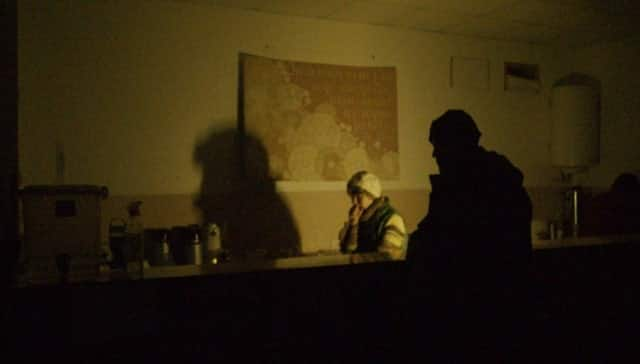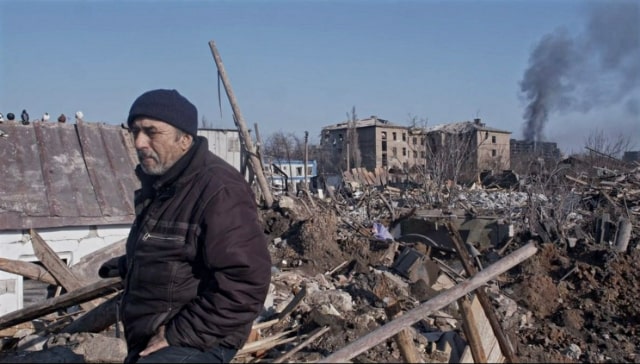In a final resistance, on May 16, 2022, the last troops standing in the Ukrainian city of Mariupol surrendered to Russia in the ongoing invasion of the country. Once a centre of arts and education, manufacturing and industries, Mariupol has been a city in conflict even before the current war, long since the unrest and war broke out in 2014 between the Ukrainian government and the separatist forces of Donetsk People’s Republic. Lithuanian filmmaker Mantas Kvedaravicius captured life in the middle of war in his much-celebrated 2016 documentary Mariupolis. He was back in the city early this year to document the people in crisis yet again, the very people who he had filmed back in 2015 and 2016. Little would he have known then that it would prove to be his last hurrah. Kvedaravicius was captured and murdered by the Russian army in early April. His fiancée, Hanna Bilobrova, who was with him at the time, brought back the footage he had filmed and edited it with his editor Dounia Sichov to make Mariupolis 2, which was shown in the Special Screenings section at the Cannes Film Festival .
Mariupolis 2 is a powerful sequel in capturing people’s reconciliation with death over the many years of facing violence. Amid bombing and shelling, death has gotten accepted by them as part of life. It’s extraordinarily moving to see how immune they have become to it collectively without quite losing their essential humanity. There is no fear, just being with each other, giving company and comfort and support to each other till such time as they themselves get consumed by death [caption id=“attachment_10876091” align=“alignnone” width=“640”]  A still from Mariupolis 2[/caption] None of them has anything more left to lose other than life itself. No money, no belongings and possessions, nothing to covet or desire, only the satisfaction of being alive. There is no past to look back at fondly, no immediate memories to hold on to, no future to dream about or aspire to either. It’s only about living in the moment, free of pride and prejudice of any kind. It’s about humanity thriving in the face of mortality. Mariupolis 2 wasn’t the only film that brought the Ukrainian crisis centrestage at Cannes this year. The festival brought yet another film set in Ukraine for the world to take note of. Featured in the Un Certain Regard section, Maksim Nakonechnyi’s Butterfly Vision is about soldier Lilia who is haunted by the ghosts of being held captive, tortured and raped in Donbas. How she fights the traumas on returning home, confronts the issue of having the child she is pregnant with and liberates herself from the continuing metaphorical imprisonment forms the core of Nakonechnyi’s debut feature. “I wanted it to be a story about hope and humanity in utterly hopeless circumstances,” she said in an interview to the festival. According to her, the film developed from the personal experiences of a lot of people who had gone through the war in one or another way and by visiting military positions, participating in the military and medical training. After making the film she wanted to do a comedy for a second feature but with the Russian invasion, things might take a different course. Much like Mantas Kvedaravicius, she has been shooting footage of everyday life in war-torn Ukraine. “Some of these stories will definitely develop into films,” she said in the Cannes interview. The Special Screenings segment also featured renowned Ukrainian filmmaker Sergei Loznitsa’s latest documentary The Natural History of Destruction. Emerging entirely from WWII archival footage, the film questions using civilian population as a means of war. It segues in thematically with the more contemporary films of Kvedaravicius and Nakonechnyi and underscores the relevance of raising the humanitarian issue in the present scenario of the conflict in Europe. Loznitsa had won the best director award for Donbass at Cannes in 2018, a film that focused satirically on the war between pro-Russian separatists and the Ukrainian government and the brutality that lies at the core of it. Beyond platforming films, the organisers were also quick to issue a statement on the eve of the festival, supporting Ukraine. “However modest as it is, we join our voices with those who oppose this unacceptable situation and denounce the attitude of Russia and its leaders.” Our thoughts go out in particular to the Ukrainian artists and film industry professionals, as well as their families whose lives are now in danger. There are those whom we’ve never met, and those whom we’ve come to know and welcomed to Cannes, who came with works that say much about Ukraine’s history and the present,” it said. The festival decided not to welcome official Russian delegations nor accept the presence of anyone linked to the Russian government, including any journalists representing, defending, or upholding the official line, but offered solidarity to the Russian artistes protesting the action of the contemporary regime. “Loyal to its history that started in 1939 in resistance to the fascist and Nazi dictatorship, the Festival de Cannes will always serve artists and industry professionals that raise their voices to denounce violence, repression, and injustices, for the main purpose to defend peace and liberty,” the communique stated. The festival’s opening night film Michel Hazanavicus ’ zombie comedy Final Cut was originally titled Z, but it was changed on being made aware that the letter Z is a symbol of Russian propaganda. In a surprise at the opening ceremony, Volodymyr Zelenskyy, invoked the role of cinema in fighting fascism, referencing Charlie Chaplin ’s The Great Dictator . “Will cinema stay silent or will it talk about it? … We need a new Chaplin who will prove that, in our time, cinema is not silent,” he said, adding, “It’s necessary for cinema not to be silent…I say to everyone who hears me: Do not despair. Hatred will eventually disappear, and dictators will die. We have to win this victory and we need cinema to ensure that this end is always on the side of freedom.” All however was not as rosy. There was ambiguity on the choice of Russian filmmaker Kirill Serebrennikov ’s film _Tchaikovsky’s Wife_ that featured in the competition section of the festival. The film had been sanctioned by many countries because of the Russian money involved (Kinoprime Foundation is one of the production companies). And there were on ground protests, including one by the team of Butterfly Vision with placard on the red carpet stating: “Russians kill Ukrainians. Do you find it offensive or disturbing to talk about this genocide?” Earlier a woman activist had shed her clothes on the red carpet showing a Ukrainian flag, blood and the message “Stop raping us”. The Ukraine crisis and the preoccupation with it showed a different side of Cannes than the glamour and stardom that gets traditionally associated with it. Fact is that Ukrainian conflict wasn’t the only contemporary crisis platformed by the festival this year. The very first screening of the festival this year was of For the Sake of Peace directed by Christophe Castagne & Thomas Sametin. About the civil war in South Sudan, the film draws attention to the fact that 350000 people have been killed since the country took birth in 2011 and zooms in on the work of two volunteers in fostering peace. Gatjang who uses football to build bridges between communities in a refugee camp in Juba, and Nandege who has been doggedly brokering peace between warring tribes in Kidepo. The film’s producer, well-known actor Forest Whitaker was given the honorary Palme d’or which apart from his artistic contributions, recognised the “humanitarian commitment to key topical issues”. In 2012, he founded the Whitaker Peace & Development Initiative (WPDI), an NGO which works in conflict areas in Uganda, South Sudan, Mexico, South Africa, Cameroon, Chad, Gabon, and even Los Angeles. The Un Certain Regard section opened with Tirailleur (Father & Soldier) by Mathieu Vadepied. About two Senegalese soldiers, father and son, fighting to liberate France during WWI, it is as much a critique of the exploitation entrenched in colonialism, the forcible recruitment of soldiers in battles that were never their own, as it is of the brutality of war. Albert Serra’s impenetrable Pacification featured in the main competition section is about a writer and a French ambassador in Polynesian island of Tahiti getting together amidst talk of submarines and nuclear testing. It may not be dealing with war but critiques the metaphorical violence endemic in morally ambiguous world of international politics and diplomacy. Claire Deni s’s Jury prize winner Stars at Noon is the love story of an American journalist and an English businessman in conflict ridden Nicaragua in 1984, a nation protesting against and emerging from dictatorship. Similar internal upheavals, in Chile in October 2019, are the subject of Patricio Guzman’s My Imaginary Country that played in the Special Screening section. It is about the spontaneous protests inspired by students demanding more democracy, better health and education system and a new constitution. While Cedric Jimenez ’s Novembre, selected this year for Out of Competition, documents the five-day investigation following the Paris attacks of 13 November 2015, Adil El Arbi and Bilall Fallah’s Rebel shown as part of the Midnight Screenings looks at jihadi recruitment in Syria through the tale of two brothers. “We wanted to show just how romantic and heroic jihad can seem at first glance, and how religion is weaponised,” they said. Rachid Bouchareb’s Nos Frangins (Our Brothers) springs from December 5th, 1986 when, in the midst of thousands of students protesting for higher education reforms, Abdel Benyahia and Malik Oussekine, get beaten to death by cops in two separate incidents. It is about collusion to cover up the deaths and attempts to discredit the victims. But, more than that, it is about immigrants in foreign lands, their perennial battle for integration, generation after generation. Simon Depardon and Marie Perennes’ Feminist Ripost in the Special Screenings section focused on the everyday war that women have to fight, against patriarchy, misogyny and abuse. Sexism is everywhere, points out the film. But so are the women and their many revolts. Namrata Joshi is a journalist, National Award-winning film critic, and a fledgling festival programmer. Read all the **_Latest News_** _,_ **_Trending News_** _,_ **_Cricket News_** _,_ **_Bollywood News_** _,_ **_India News_** and **_Entertainment News_** here. Follow us on Facebook_,_ Twitter and Instagram_._


)
)
)
)
)
)
)
)
)



